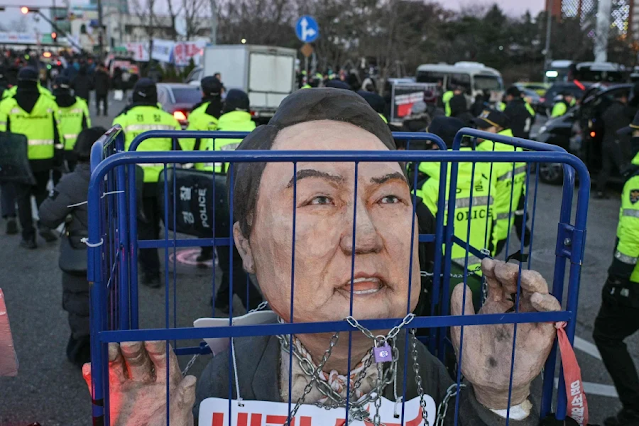The impeachment of President Yoon Suk Yeol was, for many, a critical moment for South Korea's democratic integrity. With allegations of rebellion and treason against him, the mere suggestion of overturning his impeachment is tantamount to waving a white flag to authoritarianism. If the Constitutional Court were to reinstate Yoon, the ramifications could be seismic—politically, socially, and internationally—solidifying South Korea’s descent into a regime of far-right extremism.
A Political Earthquake
An overturn would thrust Yoon Suk Yeol back into power, fully armed with the executive authority he has already been accused of abusing. For his supporters, this might appear as a victory, but for a nation barely clinging to democratic norms, it signals nothing short of a collapse into authoritarian rule.
Restoration of Executive Power: An Autocrat Rearmed
Should Yoon return to office, his administration would likely double down on the far-right policies that have already alienated much of the population. Expect intensified crackdowns on opposition leaders, civic activists, and media outlets critical of his presidency. With the judiciary’s tacit endorsement of his actions, Yoon’s unchecked power could embolden him to further erode democratic safeguards.
Deepened Political Divisions: A Country Split Apart
An overturn would deepen the already severe rift between the opposition-controlled National Assembly and the executive branch. South Korea could enter an era of legislative deadlock, where the government functions less as a democracy and more as a battlefield between a resurgent presidency and a marginalized opposition.
Public Unrest: The People Will Not Sit Quietly
The South Korean public has a long history of mobilizing against perceived injustice. Overturning the impeachment risks reigniting mass protests akin to the candlelight demonstrations that unseated former President Park Geun-hye. However, with Yoon’s documented willingness to use force—including the alleged calls for lethal weapons to suppress dissent during the illegal martial law declaration—such protests might face violent suppression, plunging the country into chaos.
Judiciary on Trial: The Cost of Credibility
The Constitutional Court’s decision would not only determine Yoon’s political future but also place the court itself under scrutiny.
A Court Politicized?
Should the court overturn the impeachment, it risks being seen as a tool of the ruling elite rather than an impartial arbiter of justice. Critics would argue that such a ruling confirms suspicions of judicial complicity in Yoon’s alleged authoritarian ambitions. South Koreans and the international community alike would question the judiciary’s independence, undermining trust in one of the country’s critical democratic institutions.
Legal Cases Loom Large
Even if Yoon regains power, the legal investigations into his alleged crimes—rebellion, treason, and martial law abuses—would remain unresolved. While he might use his restored presidency to shield himself, the legal process cannot be entirely ignored, risking prolonged instability and further erosion of public trust in the rule of law.
International Fallout: Allies on Edge
South Korea’s allies, particularly the United States, would closely monitor the fallout from such a decision.
A Tarnished Democratic Reputation
As a critical player in the Asia-Pacific region, South Korea has long been viewed as a beacon of democracy in contrast to authoritarian regimes like China and North Korea. Reinstating Yoon after such grave allegations would cast a long shadow over this reputation. For allies invested in South Korea’s stability, this would raise uncomfortable questions about whether the country remains a reliable partner.
Economic Ripples: A Nation at Risk
Political instability is kryptonite for economic stability. Already, markets are jittery, foreign investments are waning, and public confidence is plunging. Overturning Yoon’s impeachment could accelerate these trends, as protests and unrest disrupt business activity, potentially shaving billions off South Korea’s GDP.
Long-Term Consequences: A Democracy in Crisis
The ramifications of reinstating Yoon would not end with the immediate political fallout.
A Cycle of Instability
The opposition, feeling betrayed by the judiciary and executive branches, could escalate its resistance, whether through renewed impeachment efforts, legislative obstruction, or mass mobilizations. South Korea risks entering a cycle of perpetual political instability, where governance takes a backseat to unending power struggles.
The Rise of Far-Right Authoritarianism
If Yoon survives this crisis, it sets a dangerous precedent for future leaders. His actions—including the alleged illegal martial law declaration—would be implicitly legitimized, opening the door for future abuses of power. South Korea’s democracy, once considered a model for the world, could become a cautionary tale of democratic backsliding.
The Hope in Collapse?
For some, the silver lining in such a scenario is that Yoon’s reinstatement could serve as the catalyst for a broader reckoning within South Korea. Mass protests, international condemnation, and the collapse of far-right governance might ultimately pave the way for systemic reforms. The destruction of Yoon’s regime, and perhaps even the far-right ecosystem propping him up, could offer a renewed chance for South Korea to rebuild its democracy on a firmer foundation.
However, such hope comes at a steep cost. For South Korea’s people, the immediate future under a restored Yoon presidency looks bleak—a landscape marred by political strife, social unrest, and economic turmoil.
In the end, the Constitutional Court’s decision will be more than a verdict on Yoon Suk Yeol. It will be a test of South Korea’s resilience as a democracy—and a defining moment for its future.



